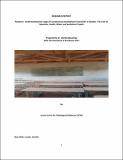Understanding the usage of Constituency Development Fund (CDF) in Zambia: The Case of Education, Health, Water and Sanitation Projects

View/
Date
2019-05Authors
Musamba, Charity Dr
Phiri, Kumbutso
Type
Research PaperLanguage
enItem Usage Stats
1,869
views
views
1,254
downloads
downloads
Abstract
Constituency Development Fund (CDF) is the generic name for a policy tool that dedicates public money to benefit specific political subdivisions through allocations and/or spending decisions influenced by their representatives in the national parliament (Centre for International Development 2009: 8-9).1 Dissimilar to large national development projects, CDF-financed projects are essentially community based and driven with the major aim of bringing facilities and services closer to people for purposes of
improving their social economic living conditions, especially reducing poverty. It is in this regard that the Jesuit Centre for Theological Reflection commissioned a study on “Understanding the usage of Constituency Development Fund (CDF) in Zambia: The Case of Education, Health, Water and Sanitation Projects,” in February 2019. The Study was conducted in four constituencies namely Lukasha in KASAMA, Mongu Central in Mongu, Simoonga in Livingstone and Wusakile in Kitwe between February and March 2019
Description
Constituency Development Fund (CDF) is a government budget allocation mechanism that channels a specific portion of the national budget to the constituencies to finance development projects such as school facilities, health clinics and water supply systems (International Budget Partnership 2010; Keefer and Khemani 2009; Policy Forum 2009). As a development financing mechanism, CDF is appreciated because it is perceived as an appropriate tool for the effective delivery of projects, direct financing of community development, facilitation of the local population in development as well as responds directly
to the concrete development demands of constituencies (Baskin 2010). There are also some criticisms levelled against the CDF mechanism such as it being a quick fix and fiscal illusion, or free money resulting in an increase on long-term expenditure (ibid). In addition, CDF may also have a negative impact on governments' capacity to contribute to service delivery and development, especially at the local government level (ZIPAR 2012).